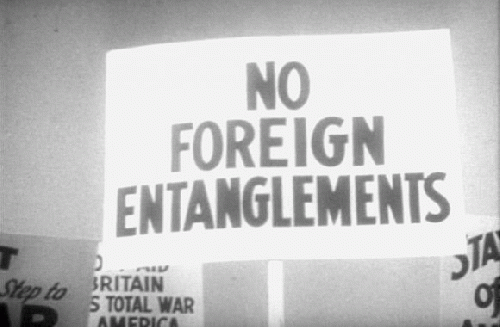Is It Really "Isolationist" Not To Risk A New Mid-East War Today?
By William Boardman
American contradictions are an old story in which Syria is a new
chapter
During this lull in the Syria tsouris, we're hearing way too many beltway blowhards bloviate about something they're calling "our new isolationism" or "the post-American world" or some other extreme label designed to push a personal agenda. Everyone needs to chill out and get a little perspective. What we're now doing about Syria is better than what we were about to do, and a whole lot better than what we've done to too many other countries over the years.
It should be immediately obvious that the United States, with 700 foreign military bases (compared to Russia's 11), is not exactly isolationist, and won't be any time soon. What follows is an attempt at a longer reassurance that no apocalypse is at hand just because we're not bombing Syria or otherwise being exceptionally American.
In the Beginning
there was Common Sense, and the Declaration
Originally, during the late 18th century, American exceptionalism included a determined sense of isolationism (and non-interventionism). At the same time, many of these isolationists also articulated the fight for American freedom as a fight for the freedom of everyone in the world. That exceptional American contradiction remains vividly alive in public discourse more than 200 years later.
Thomas Paine's "Common Sense" (1775), best known for making the case for American freedom from British rule, argued that one benefit of independence would be that America would no longer be forced (as a colony) to support European wars irrelevant to American interests -- a benefit to be protected by a policy of isolationism. Even before the United States existed, American revolutionaries were wary of an alliance even with a supportive France. The Second Continental Congress eventually allied the nascent nation with France largely because that seemed to be necessary to win the Revolutionary War.
George Washington, in his carefully re-written Farewell Address (1796), famously articulated his country's isolationist policy (without actually using the phrase "entangling alliances"):
(Note: You can view every article as one long page if you sign up as an Advocate Member, or higher).






